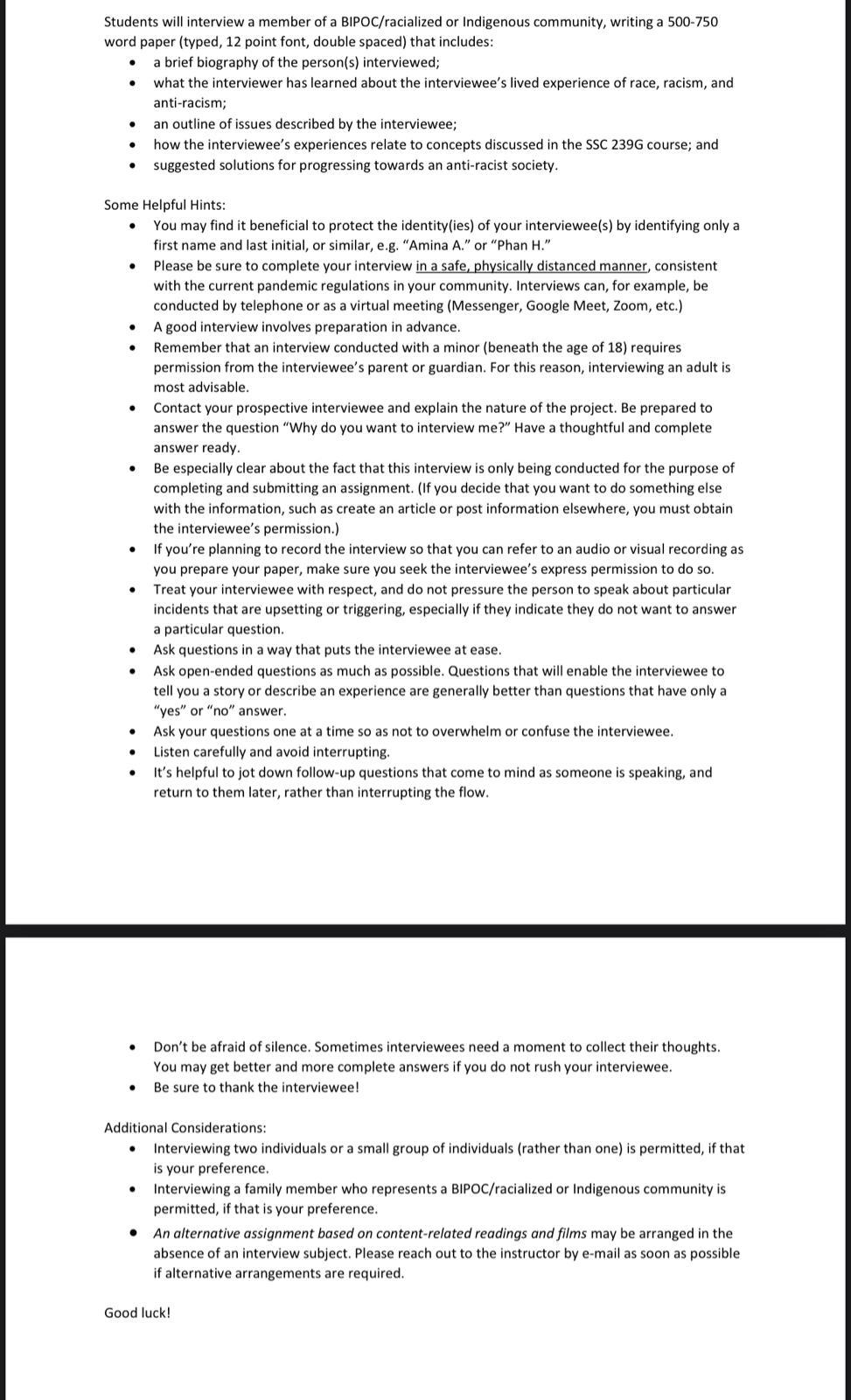
. Students will interview a member of a BIPOC/racialized or Indigenous community, writing a 500-750 word paper (typed, 12 point font, double spaced) that includes: a brief biography of the person(s) interviewed; what the interviewer has learned about the interviewee's lived experience of race, racism, and anti-racism; an outline of issues described by the interviewee; how the interviewee's experiences relate to concepts discussed in the SSC 2393 course; and suggested solutions for progressing towards an anti-racist society. . . Some Helpful Hints: You may find it beneficial to protect the identity (ies) of your interviewee(s) by identifying only a first name and last initial, or similar, e.g. "Amina A." or "Phan H." Please be sure to complete your interview in a safe, physically distanced manner, consistent with the current pandemic regulations in your community. Interviews can, for example, be conducted by telephone or as a virtual meeting (Messenger, Google Meet, Zoom, etc.) A good interview involves preparation in advance. Remember that an interview conducted with a minor (beneath the age of 18) requires permission from the interviewee's parent or guardian. For this reason, interviewing an adult is most advisable. Contact your prospective interviewee and explain the nature of the project. Be prepared to answer the question "Why do you want to interview me?" Have a thoughtful and complete answer ready. Be especially clear about the fact that this interview is only being conducted for the purpose of completing and submitting an assignment. (If you decide that you want to do something else with the information, such as create an article or post information elsewhere, you must obtain the interviewee's permission.) If you're planning to record the interview so that you can refer to an audio or visual recording as you prepare your paper, make sure you seek the interviewee's express permission to do so. Treat your interviewee with respect, and do not pressure the person to speak about particular incidents that are upsetting or triggering, especially if they indicate they do not want to answer a particular question. Ask questions in a way that puts the interviewee at ease. Ask open-ended questions as much as possible. Questions that will enable the interviewee to tell you a story or describe an experience are generally better than questions that have only a "yes" or "no" answer. Ask your questions one at a time so as not to overwhelm or confuse the interviewee. Listen carefully and avoid interrupting. It's helpful to jot down follow-up questions that come to mind as someone is speaking, and return to them later, rather than interrupting the flow. . Don't be afraid of silence. Sometimes interviewees need a moment to collect their thoughts. You may get better and more complete answers if you do not rush your interviewee. Be sure to thank the interviewee! Additional Considerations: Interviewing two individuals or a small group of individuals (rather than one) is permitted, if that is your preference. Interviewing a family member who represents a BIPOC/racialized or Indigenous community is permitted, if that is your preference. An alternative assignment based on content-related readings and films may be arranged in the absence of an interview subject. Please reach out to the instructor by e-mail as soon as possible if alternative arrangements are required. Good luck! . Students will interview a member of a BIPOC/racialized or Indigenous community, writing a 500-750 word paper (typed, 12 point font, double spaced) that includes: a brief biography of the person(s) interviewed; what the interviewer has learned about the interviewee's lived experience of race, racism, and anti-racism; an outline of issues described by the interviewee; how the interviewee's experiences relate to concepts discussed in the SSC 2393 course; and suggested solutions for progressing towards an anti-racist society. . . Some Helpful Hints: You may find it beneficial to protect the identity (ies) of your interviewee(s) by identifying only a first name and last initial, or similar, e.g. "Amina A." or "Phan H." Please be sure to complete your interview in a safe, physically distanced manner, consistent with the current pandemic regulations in your community. Interviews can, for example, be conducted by telephone or as a virtual meeting (Messenger, Google Meet, Zoom, etc.) A good interview involves preparation in advance. Remember that an interview conducted with a minor (beneath the age of 18) requires permission from the interviewee's parent or guardian. For this reason, interviewing an adult is most advisable. Contact your prospective interviewee and explain the nature of the project. Be prepared to answer the question "Why do you want to interview me?" Have a thoughtful and complete answer ready. Be especially clear about the fact that this interview is only being conducted for the purpose of completing and submitting an assignment. (If you decide that you want to do something else with the information, such as create an article or post information elsewhere, you must obtain the interviewee's permission.) If you're planning to record the interview so that you can refer to an audio or visual recording as you prepare your paper, make sure you seek the interviewee's express permission to do so. Treat your interviewee with respect, and do not pressure the person to speak about particular incidents that are upsetting or triggering, especially if they indicate they do not want to answer a particular question. Ask questions in a way that puts the interviewee at ease. Ask open-ended questions as much as possible. Questions that will enable the interviewee to tell you a story or describe an experience are generally better than questions that have only a "yes" or "no" answer. Ask your questions one at a time so as not to overwhelm or confuse the interviewee. Listen carefully and avoid interrupting. It's helpful to jot down follow-up questions that come to mind as someone is speaking, and return to them later, rather than interrupting the flow. . Don't be afraid of silence. Sometimes interviewees need a moment to collect their thoughts. You may get better and more complete answers if you do not rush your interviewee. Be sure to thank the interviewee! Additional Considerations: Interviewing two individuals or a small group of individuals (rather than one) is permitted, if that is your preference. Interviewing a family member who represents a BIPOC/racialized or Indigenous community is permitted, if that is your preference. An alternative assignment based on content-related readings and films may be arranged in the absence of an interview subject. Please reach out to the instructor by e-mail as soon as possible if alternative arrangements are required. Good luck







